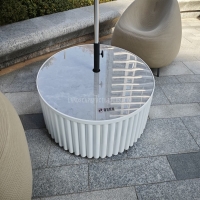Welcome to the website for landscape facilities products and knowledge.
How does the trash can’s design address the challenges of remote or off-grid locations?
Waste management in remote or off-grid locations presents unique challenges, including limited infrastructure, harsh environments, and lack of regular maintenance. Innovative trash can designs address these issues through several key features:
1. Durability and Weather Resistance: Off-grid trash cans are built with rugged materials like reinforced steel or UV-resistant plastics to withstand extreme weather, from desert heat to Arctic cold.
2. Solar-Powered Compaction: Some models integrate solar panels to power compactors, reducing waste volume and minimizing collection frequency—ideal for areas with sparse servicing.
3. Animal-Proof Mechanisms: Designs include locking lids or weighted bases to deter wildlife, preventing scattered waste in rural or wilderness settings.
4. Modular and Portable Designs: Lightweight yet sturdy bins allow easy transport to campsites, mining sites, or disaster relief zones, often featuring collapsible or stackable options.
5. Low-Maintenance Features: Non-corrosive coatings and easy-clean surfaces reduce upkeep, while odor-control systems (like charcoal filters) manage smells without electricity.
6. IoT Integration (Optional): Advanced models use sensors to alert waste levels via satellite networks, optimizing pickup routes for efficiency in disconnected regions.
By combining sustainability with practicality, these trash cans ensure efficient waste disposal even in the most isolated locations, supporting environmental goals and community health.
Related search:

Recommendation
Round metal tube border design table with tempered glass or granite countertop on the top.